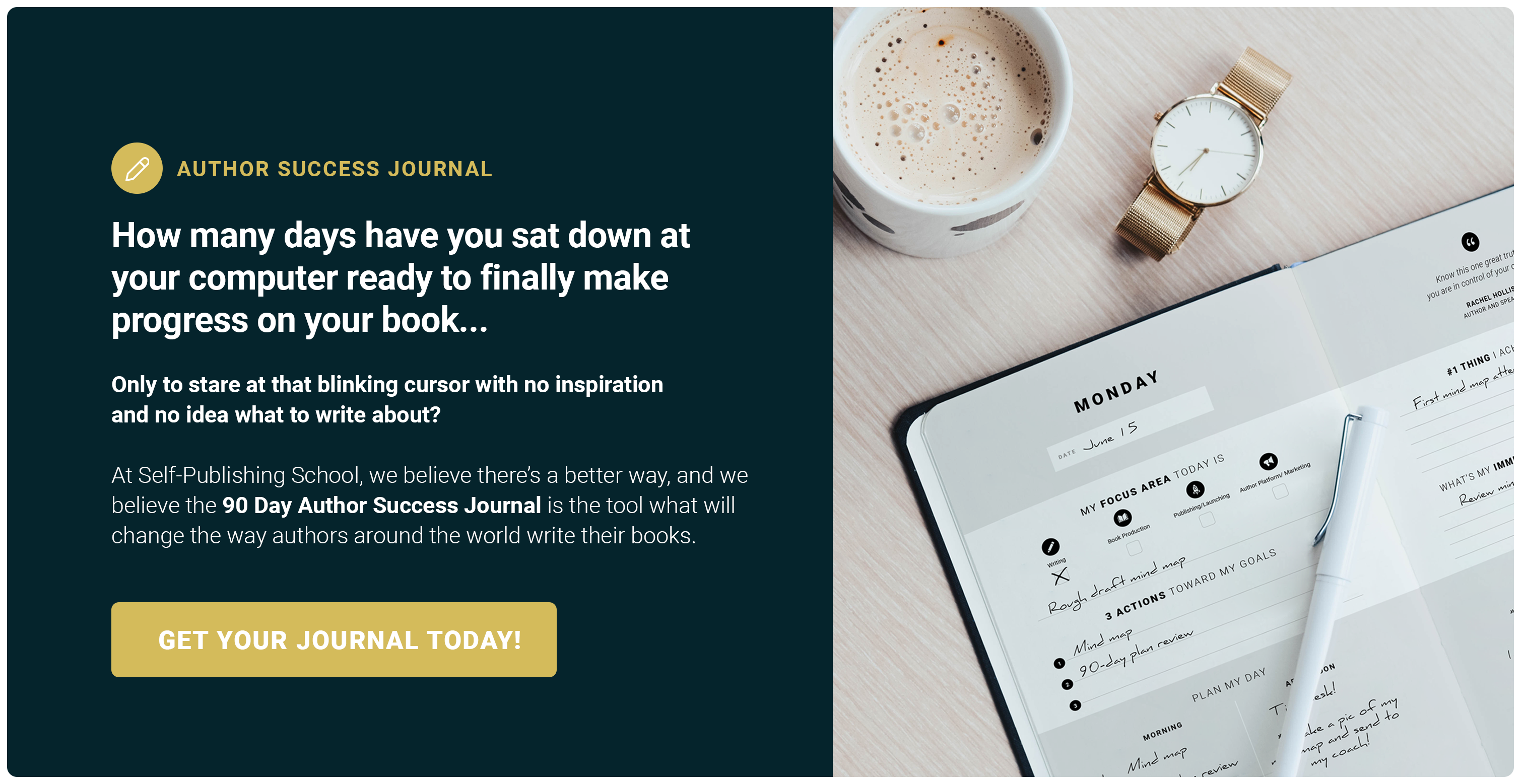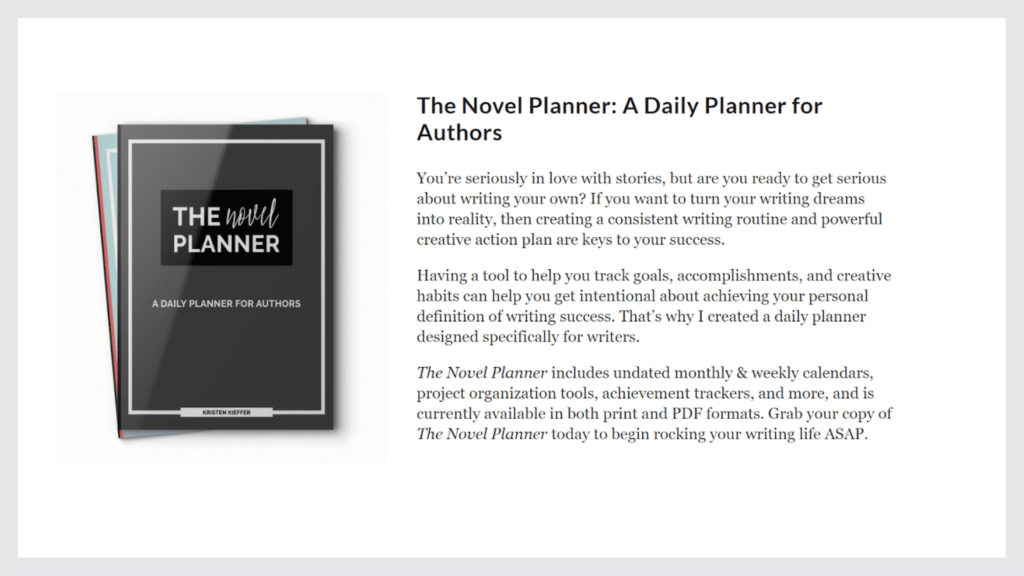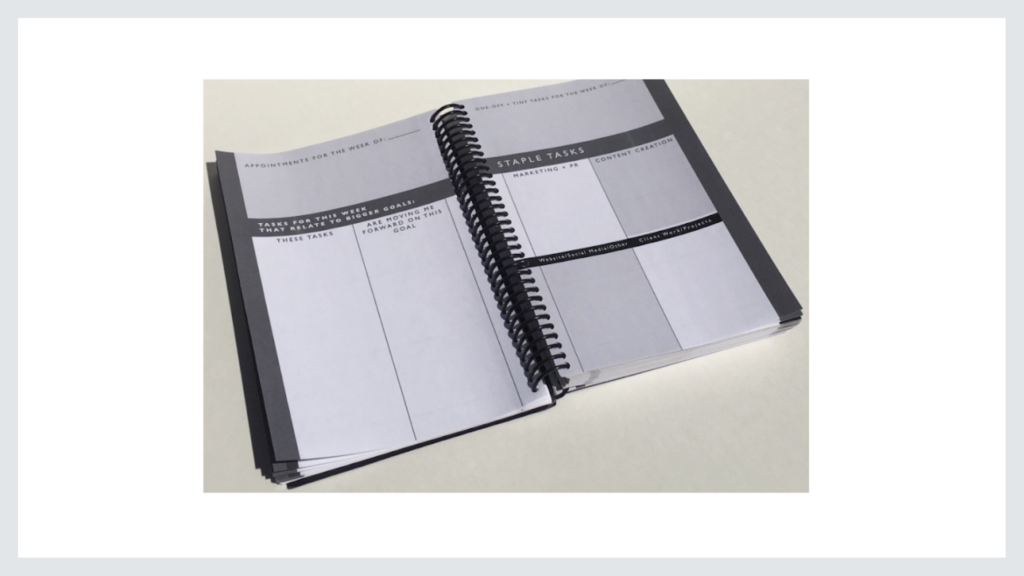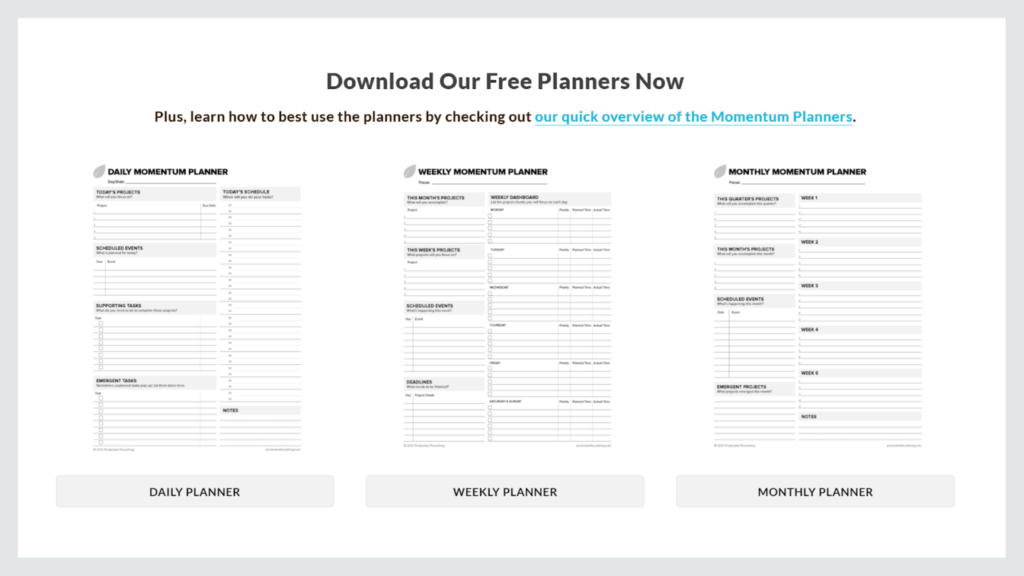Plenty of people try planners and find it’s not for them. But a lot of them, I’d bet, haven’t tried author planners. If you’re a writer looking to keep track of your projects, it turns out that it can make all the world of difference to have a planner tailored to your needs.
In this article, I’m going to talk about what author planners are, how you can benefit from using one, show you some author planners that might work for you, and give you some tips and tricks for actually using your author planner for more than a couple weeks.
This guide to using an author planner covers:
- What is an author planner?
- Benefits of using an author planner
- Best planners for writers
- How to use an author planner successfully
What is an author planner?
A regular planner will be divided into months of the year and then weeks of the year—some also break down into individual days. They’re intended to encompass your entire life. You might keep track of your workout routine, make notes of upcoming doctors’ appointments, and schedule time to write.
An author planner, however, is focused more on your writing. You’re meant to use it primarily for your authorly tasks, whatever those might be—I like to think of an author planner like a work journal. Freelance writers might use it to keep track of their freelance work, and novelists can use them to plan out their projects.
Benefits of using an author planner
If the idea of grabbing a planner for your writing sounds like time-consuming hell, I totally understand. I also doubted the efficacy of using any kind of daily tracker before I found one that worked for me. And it may be that planners ultimately aren’t for you, but you can’t knock it till you’ve tried it! Used correctly, they can be extremely helpful for not just your writing, but also your professional growth and development.
Here are just a few benefits of using an author planner:
1. Keeps writing in one place
Writing can get complicated quickly, and it can be difficult to condense everything that needs to get done into one tiny margin of your daily planner. If you’re already the type of person who loves to work with a planner, you might find a writing planner helpful because it gives you a designated space with lots of room to plan out your writing tasks.
Additionally, it’ll keep your mind from wandering off when you’re trying to plan out your writing—in a regular planner, you might be distracted looking at all your other tasks for the month, but you won’t have that to stress you out in your author planner.
Even if you’re brand new to planners, having a planner designated for writing is still a huge plus! Instead of needing to keep track of every little thing you do, an author planner is just for your writing. This is much more approachable, and it’ll be way easier to stick with long-term.
2. Organize big tasks
If you’ve written a novel before, you’ll know it’s extremely complicated. Writing and publishing a novel requires a thousand different tasks, from drafting to editing to cover art to finding beta readers and so on. It seems straightforward on the face of it—write a book, publish it—but it gets overwhelming quickly.
A planner gives you space to map out these big tasks. You can break huge goals like writing a book into achievable chunks. Not only does this help you see what you need to get done to complete big tasks, but it also helps make those big tasks doable by breaking them into bite-sized pieces.
3. Become a master at time management
Ever sit down to write (for me, this is especially true of revising), stare at your computer, and wonder what in the world you’re even supposed to do? Sometimes writers burn up entire weeks of work piddling around in revisions, trying to sort through a difficult chapter, or unsure what the next step is in their publication process. This wastes valuable time, and it doesn’t have to be so stressful!
Because a planner will help you map out your project into small, achievable goals, it will also help keep you focused on a day-to-day basis. Being able to write out what you need to do on any given day will make your job a lot easier, and it’ll make things less stressful if you need to skip a day or a week.
You might be surprised how much you can get done in a given writing session or work day when you go in with clear goals!
4. Keep track of little things
You may have heard this advice before, but I’ll repeat it: if you think of an idea, you should write it down immediately. Ideas for revisions, new stories, or anything along those lines should be written down as soon as possible, because they will escape otherwise.
If you have an author planner, guess what? You’ve got a designated place for this type of thing. No more furiously hunting through your Notes app!
Author planners are also perfect for jotting small tasks that might otherwise get forgotten. Maybe you’re supposed to read someone else’s work once a week for a critique group, or maybe you meant to send a story to your friend to hear their thoughts. Writing things down, on their own, helps your brain remember them better, so even if you don’t have to check the planner to remember to do it, the planner still helps you out.
Best planners for writers
There are approximately six billion planners out there, so where does one get started? I’ve got a few author planners I’d like to talk about here.
90-Day Author Success Planner

If you’re super serious about getting your project written and published and you’re looking for a planner that will guide you through the whole process, this is the planner for you.
Not only will this be a place for you to keep track of your goals, but with this planner comes video training which guides your progress, as well as a complimentary one-on-one coaching call to discuss your goals.
- 1-on-1 coaching call to discuss your book idea, author goals, and plan for success
- Video training by Chandler Bolt which will show you how to best use your planner and principles for being successful with your writing
- Weekly preview pages to map out your week to come
- Daily pages with outlines for maximizing your productivity
The Novel Planner: A Daily Planner for Authors

This planner is intended for writers of all types! Novelists might find the pages relating to brainstorming and tracking long-term milestones especially helpful.
Features:
- 12-month calendar
- 52 weekly calendar spreads (start day: Monday)
- Places to set writing goals and schedule writing-related business tasks
- Pages for planning, brainstorming, and outlining your novel
- Pages to track yearly accomplishments and milestones
The Freelancer Planner

This journal is a great option for freelance writers looking to organize both their personal and professional writing.
Features:
- Monthly view for monthly goals
- Sections to keep track of income
- Weekly pages
- End-of-month recaps where you can track goal progress
Free Planners and Worksheets by Productive Flourishing

If you’ve never used a planner before and you’re hesitant to spend money on one, give planning a trial run with Productive Flourishing’s free planners and worksheets. These can be customized based on your writerly needs.
Features:
- Free
- Monthly, weekly, or daily options for different goals
- Easily customizable
- Available in digital form
How to use an author planner successfully
Find the planner that works for you
First and most importantly, you have to use something that works for you. You’re not going to use a planner you hate, and even if you do, it’s not likely to actually help you.
Some people love to plan out every single hour of their day or their writing sessions, down to the minute. An author might want a daily word count with specific scenes in mind. Other authors might stick to monthly goals and more time-oriented daily goals, like “write for thirty minutes” instead of “write five thousand words.”
If planning out your session down to the minute makes you feel stressed instead of prepared, don’t do it! If it helps, feel free. This is for you to use and make the most of your writing time, so find the planner that best helps you out.
Schedule time to use your planner
Building your planner into your daily routine will help you come back to it. As with any new thing in your life, you’ve got to incorporate it with some intention if you want it to stick. Here are a few different ways you might schedule time to use your planner:
- Use your planner for the first and last five minutes of every session to check in with your goals, set intentions for that day, and makes notes for what you want to do tomorrow
- Use your planner first thing in the morning, when you’re feeling refreshed
- Use your planner before bed, when you’re thinking about what needs to get done tomorrow
Scheduling out time to use your planner will do two things: first, it will help you stick with it. Second, it will train your brain to actually think about your writing goals when you sit down for planner time.
Map out big tasks
Your goal for the year might be “publish a book,” but this is a hugely daunting task that you can’t do in one day. In a planner, you can break this into pieces.
Maybe January and February are designated for drafting, and maybe you put weekly word goals in to help you get closer and closer to finishing that first draft. You can do this with any big project. Research what you need to do to get it done, divide the big tasks into as many small tasks as you need, and follow the path you’ve created for yourself!
Customize it for your lifestyle
Finally, remember that planners are ultimately notebooks, and you can do whatever you want with them. You’ll want to find one with features that are helpful to you, but there’s no obligation to follow its format to the letter if there are little things you don’t like or that aren’t useful.
Maybe you ignore the hourly breakdown of each day, because you don’t like planning out your days to the hour. You might ignore the monthly calendar section at the beginning of a lot of planners (I do both of these things!).
Maybe there’s a column that’s supposed to be for exercise, but you think it’d be great for keeping track of writing sprints—do that!
An author planner is a great tool for writers, and as such, it should be something that you as a writer are excited to use because it works.